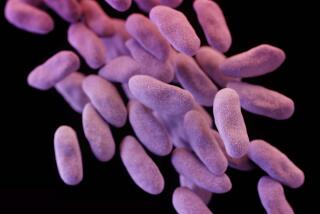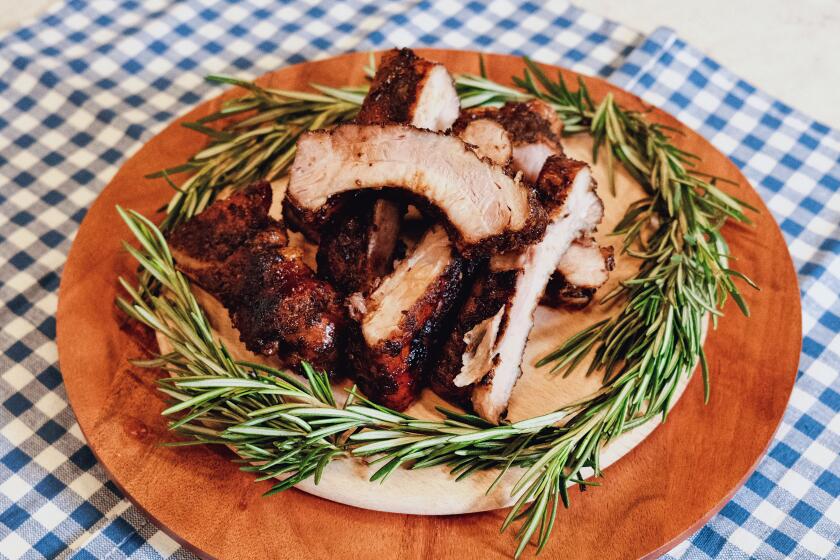Germs Putting a Strain on This Marriage
- Share via
I regret to report that this column has been involved in a marital dispute. A copy of last week’s item on germs in the home was placed in a prominent position by one member of a scrapping couple. The other member called me to ascertain, once and for all, the proper way to cleanse a cutting board. (This column! Clipped and prominently placed! I thought that only happened to Ann Landers. . . .)
“If I cut a piece of meat--let’s say a piece of pork--then I wash the cutting board with some dish soap and the scouring surface of a sponge, and then I dry it, isn’t it clean?” demands “Pete” of San Diego. “My wife says this isn’t good enough. It’s become a raging argument in our marriage.”
Pete’s spouse wants him to douse that cutting board with bleach or Lysol after the scrubbing step, he says--but Pete thinks that’s overkill. Sensing the delicacy of the situation, I called University of Arizona microbiologist Chuck Gerba--the “Dr. Germ” we referred to in last week’s column.
Gerba is a man who is way into germs. His older son’s middle name is Escherichia--the “E” in E. coli. (Gerba told his father-in-law it was the name of a biblical king.) Gerba’s second son would have been called Erwinia (yet another little microbe) or, if a girl, Salmonella, but Gerba’s wife insisted on staying fully conscious during the delivery and told the doctors that on no account was her husband to name the baby.
Anyway, Pete: Gerba sides with your wife. Scrubbing just spreads the germs around, he says. So sometimes--here’s happy news--it’s better not to clean up at all. Bachelors, Gerba adds, are thus in some respects often the cleanest--because they never clean. “A new life form could probably evolve in their sink, but it doesn’t get spread,” he says.
But before Pete’s wife starts crowing, here’s a different view from Dr. Stuart Levy of Tufts University. Levy thinks people are going over the top in their quest for squeaky cleanliness. Yes, agents such as bleach confer extra protection, he says. But simply scrubbing a cutting board with soap will send many microbes skittering down the drain.
How about a compromise? Pete could load the cutting board into the dishwasher after scrubbing it, Gerba says. The heat of the drying cycle will help quell germs that might cause food poisoning.
Escherichia, eh? Me, I’ve always thought Chlamydomonas would be a nice name for a girl; or perhaps Fasciola. (Look ‘em up.)
Worms Could Save Lives
Continuing our wild kingdom theme, I recently had a stimulating chat about earthworms with Edwin Cooper, a UCLA professor. He’s been studying the little squirmers since the ‘60s (he once studied tadpoles as well, but the worms were so interesting he dumped the frogs). Worms, he says, have wonderful immune systems, and so they should: “They’re living in dirt filled with all kinds of microbes.”
Way back when, Cooper did little tissue transplants and showed worms reject grafts from other worms much like we reject transplants from other people. And though earthworms don’t make all the fancy antibodies that we do, they have many molecules that fight infections.
Cooper’s been working on some molecules that kill bacteria and fungi in the lab--even certain cancer cells. They could, he hopes, turn out to be useful new drugs. This summer, he and other scientists will explore this at an intensive, NATO-sponsored earthworm workshop at a castle near Prague, Czechoslovakia.
Don’t grimace! After all, docs’ medicine cabinets are stuffed with drugs from the likes of leeches and bread molds, and scientists are looking for new ones in sea critters, fruit flies, you name it.
Some oldies but goodies: penicillin and cyclosporin, from molds; an anticoagulant from leeches; aspirin, from willow bark; and the heart drug digoxin from foxgloves.
*
If you have an idea for a Booster Shots topic, write or e-mail Rosie Mestel at the Los Angeles Times, 202 W. 1st. St., Los Angeles, CA 90012, rosie.mestel@latimes.com.
More to Read
Eat your way across L.A.
Get our weekly Tasting Notes newsletter for reviews, news and more.
You may occasionally receive promotional content from the Los Angeles Times.









